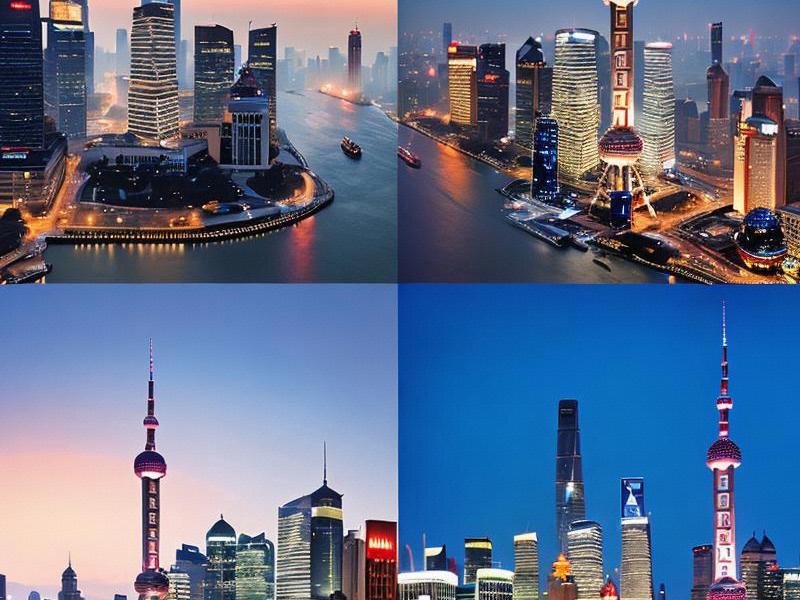
Nestled along the eastern coast of China, Shanghai stands as a beacon of modernity and a testament to the country's remarkable transformation over the past few decades. Once a modest fishing village, Shanghai has risen to become one of the world's most dynamic and influential cities, renowned for its skyline that seems to pierce the heavens, its bustling streets that never sleep, and its ability to seamlessly blend the old with the new.
The city's economic prowess is nothing short of extraordinary. As the financial capital of China, Shanghai is home to the world's busiest container port, the iconic Lujiazui Financial District, and a burgeoning tech scene that rivals Silicon Valley. The city's GDP has consistently ranked among the highest in the nation, driven by a robust manufacturing sector, a thriving service industry, and a growing digital economy. Shanghai's economic success is not just a reflection of its own efforts but also a microcosm of China's broader economic miracle.
However, Shanghai's story is not solely one of economic achievement. The city is also a treasure trove of cultural heritage, where the echoes of the past blend harmoniously with the vibrancy of the present. The Bund, a historic waterfront promenade, offers a stunning view of the futuristic skyline across the Huangpu River, juxtaposing the colonial architecture of old Shanghai with the glass and steel skyscrapers of the new. The Yu Garden, a classical Chinese garden, provides a serene escape from the urban hustle, with its meticulously landscaped ponds, rockeries, and pavilions.
Shanghai's cultural scene is as diverse as its population, which is a melting pot of different ethnicities and nationalities. The city is a hub for the arts, with world-class museums like the Shanghai Museum showcasing an impressive collection of Chinese art, and the Power Station of Art, a former power plant turned contemporary art gallery. The city's theaters and concert halls host a wide range of performances, from traditional Peking opera to avant-garde theater productions.
上海龙凤419自荐 In recent years, Shanghai has also emerged as a leader in urban planning and sustainability. The city has invested heavily in green initiatives, such as the construction of the world's first maglev train line, which connects the urban center with the international airport, and the development of the Xujiahui Park, a massive green space in the heart of the city. Shanghai's commitment to sustainability is evident in its efforts to reduce carbon emissions, promote renewable energy, and crteealivable urban environments.
The city's global influence extends beyond its economic and cultural achievements. Shanghai has been a key player in China's Belt and Road Initiative, a massive infrastructure project aimed at enhancing connectivity and trade between Asia, Africa, and Europe. The city's free trade zone, established in 2013, serves as a testing ground for economic reforms and a gateway for foreign investment.
Shanghai's success story is not without its challenges. The rapid urbanization has led to issues such as housing shortages, traffic congestion, and environmental concerns. However, the city's government has been proactive in addressing these challenges, implementing policies to promote affordable housing, improve public transportation, and enhance environmental protection.
One of the most significant initiatives is the construction of the Hongqiao Integration Zone, a sprawling complex that combines business, transportation, and residential facilities. This integrated approach to urban development aims to reduce the need for long commutes, promote economic growth, and crteeaa more sustainable urban environment.
上海龙凤419油压论坛 Shanghai's educational institutions also play a crucial role in the city's development. Renowned universities like Fudan University and Tongji University attract students and researchers from around the world, fostering innovation and collaboration. The city's emphasis on education and research has contributed to its reputation as a global center of learning and innovation.
The city's culinary scene is another aspect that reflects its unique blend of tradition and modernity. Shanghai cuisine, known for its sweet and savory flavors, is a highlight of the city's gastronomic offerings. From the famous xiaolongbao (soup dumplings) to the delicate shengjianbao (pan-fried buns), Shanghai's food culture is a testament to the city's rich culinary heritage.
In conclusion, Shanghai is a city that embodies the best of both worlds. It is a place where ancient traditions coexist with cutting-edge innovation, where the past informs the present, and where the future is shaped by bold visionaries. As Shanghai continues to grow and evolve, it remains a symbol of China's rise on the global stage and a source of inspiration for cities around the world.
上海品茶网 The city's ability to balance economic development with cultural preservation, urban planning with sustainability, and tradition with innovation is a model that other cities can learn from. Shanghai's story is not just about its achievements but also about the spirit of resilience and adaptability that has driven its transformation.
As we look to the future, Shanghai's journey is far from over. The city is poised to continue its ascent as a global leader, leveraging its strengths and addressing its challenges with determination and ingenuity. Whether it is through advancements in technology, cultural exchanges, or sustainable urban development, Shanghai is set to remain at the forefront of global progress.
In the words of the Chinese saying, "A journey of a thousand miles begins with a single step." Shanghai's remarkable journey from a small fishing village to a global metropolis is a testament to the power of vision, hard work, and perseverance. As we celebrate the city's achievements, we also look forward to the exciting possibilities that lie ahead for this dynamic and ever-evolving city.
